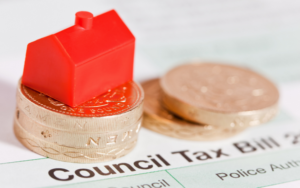
Council tax is a bill payable by anyone over the age of 18 who owns or rents a property in the UK. However, there are some instances where you may receive a council tax reduction or exemption.
In this article, we look at what council tax is, how council tax works and who has to pay council tax. We also explain what happens if you don't pay council tax and what to do if you are struggling to afford it. For ways to save on council tax, read our article, 'How to save money on council tax'.
What is council tax?
Council tax is a bill payable to your local council for services that they offer such as household waste collection, policing, education and libraries. Council tax is payable by most people that rent or own a home over the age of 18 but how much is paid varies depending on personal circumstances and whether you are liable for any discounts or exemptions.
How is council tax worked out?
Council tax is based on the council tax valuation band set by the Valuation Office Agency (VOA). Which band your property is in is based on how much your property was worth on 1st April 1991 and the band your property falls under determines how much you pay for your council tax each year. Your council tax band is liable to change at any point, particularly if you have had any work done to your property or if your property has changed from a house to a flat. The following table shows the different council tax bands and the value of the property on 01/04/91.
| Council Tax band | Property value on 1st April 1991 |
| A | £0 - £40,000 |
| B | £40,001 - £52,000 |
| C | £52,001 - £68,000 |
| D | £68,001 - £88,000 |
| E | £88,001 - £120,000 |
| F | £120,001 - £160,000 |
| G | £160,001 - £320,000 |
| H | £320,000+ |
It is possible to query your council tax band if you believe that your property is in the wrong band but this could mean you could end up paying more if your property is found to be in a higher tax band. Our article has more information on how to challenge your council tax band, 'Nearly a third of council tax challenges are successful – How much could you save?'
How much does council tax cost?
How much you pay for your council tax band varies depending on which band your property falls under. Typically lower council tax bands are A-D and higher council tax bands are E-H. How much you pay for your council tax in each band varies depending on the council that you reside under as each council charges a different amount. How much you pay will also vary depending on your personal circumstances and you may be entitled to a council tax reduction or exemption.
Do I have to pay council tax?
You’ll usually be required to pay Council Tax if you’re 18 or over, and own or rent a home. A full Council Tax bill is based on at least 2 adults living in a home and spouses and partners who live together are jointly responsible for paying the bill.
Who doesn't have to pay council tax?
Some people don't have to pay council tax and are 'disregarded' when working out how many people live in a property. The following are classed as disregarded:
- Children under 18
- People on some apprentice schemes
- 18 and 19-year-olds in full-time education
- Full-time college and university students
- Young people under 25 who get funding from the Skills Funding Agency or Young People’s Learning Agency
- Student nurses
- Foreign language assistants registered with the British Council
- People with a severe mental impairment
- Live-in carers who look after someone who isn’t their partner, spouse, or child under 18
- Diplomats
Am I entitled to a council tax discount?
Your Council Tax bill can be reduced for one or more of the following reasons:
- If you're a single occupant
- If your disability means you need more living space via the Disabled band reduction scheme -
- If you are severely mentally impaired
- If you are unemployed or receive a low income
If you think you may be eligible for a discount on your council tax you should contact your local council. More information on some of the discounts and exemptions can be found below.
Single occupant discount
You may be entitled to a 25% discount on your council tax if you are a single occupant of the property you live in or if you are the only adult living in the home.
Disabled band reduction scheme
Having a disability does not automatically entitle you to a reduction and there are certain requirements that must be met including that the property must be the main residence of one disabled person (adult or child). It must also have at least one of:
- An extra bathroom, kitchen or other room that you need for the disabled person
- Extra space inside the property to allow for use of a wheelchair - wheelchairs for outside use only are excluded
The room or the wheelchair must be of major importance to the disabled person's well-being due to the extent of their disability. The disabled person can be an adult or child and does not have to be responsible for paying the Council Tax bill.
If your home is eligible, your bill will be reduced to that of a property in the next Council Tax band down. Even if your property is in Band A (lowest), you will still receive a 17% reduction.
Discount for people who are severely mentally impaired
To be eligible for this exemption, a doctor's certificate will be required stating that you are severely mentally impaired and you will also require proof that you are entitled to certain benefits. You may have to check with your local council regarding which benefits qualify for the discount.
How much you get will vary on your circumstances and examples are listed below:
- You may get 100% discount if you qualify as severely mentally impaired and you live on your own or with any other adult in your household who is also severely mentally impaired or a full-time student.
- You may get 50% discount if you qualify as severely mentally impaired and everyone else in your household is disregarded
- You may get 25% discount if you live with someone who is severely mentally impaired and there are either no other adults in your household or everyone else in your home is disregarded.
Discount if you are unemployed or on a low income
You may get a Council Tax reduction if you pay Council Tax and your income and capital (savings and investments) are below a certain level. You will need to apply to your council for a council tax reduction and how much you get will depend on who lives in the household, if you receive any benefits and your income.
If you are unable to qualify for a Council Tax Reduction because your income is too high but you are the only adult responsible for paying council tax, you may instead qualify for a second adult rebate. You cannot get a second adult rebate if you qualify for a council tax reduction. In order to get a second adult rebate the adult must be:
- Not your partner or civil partner
- Aged 18 or over
- Not paying you rent
- Does not jointly own your home
- Does not have a contract with your landlord
- On a low income or in receipt of certain benefits
Is my property exempt from council tax?
There may be instances where you do not have to pay council tax on a property. We share some examples below.
Second-home discount
You may pay less Council Tax if you own or rent a property that isn’t the home where you usually live. Some councils give furnished second homes or holiday homes a discount of between 10% and 50%. The amount of discount varies and is decided by your local council, so you will need to contact them directly to see if you qualify.
Unoccupied or renovated properties
- Unfurnished homes where no one lives are no longer exempt (they used to be exempt for 6 months) but your local council may decide to give you a discount.
- Homes undergoing major repair work or structural changes (e.g. rebuilding walls or floors) can be exempt for a limited period of time. Your council will tell you when you have to start paying and you’ll get a "completion notice" that tells you the date you must start repaying Council Tax.
- Homes, where the owner has died, are exempt for up to 6 months until probate (your legal right to sell the home) is granted.
Some homes are exempt for as long as they remain empty. They include homes:
- Of someone in prison (except for not paying a fine or Council Tax)
- Of someone who has moved into a care home or hospital
- That have been repossessed
- That cannot be lived in by law
- That are kept empty because they have been compulsorily purchased and so will be demolished
What happens if I cannot pay my council tax?
According to data published in 2023 by the Department for Levelling Up, Housing and Communities, council tax arrears (debts) totalled £5.5 billion. Council Tax arrears are a "priority debt", which means you must pay them back before other outstanding debts such as credit card bills. If you ignore Council Tax arrears, your council will likely take you to court quickly to get all the money back at once. You’ll have to pay court costs, and possibly bailiff fees, as well as the debt itself. So, if you find yourself in arrears now, or you're worried about the future, what action can you take?
What will happen if I fail to keep up a repayment plan?
If you fail to agree or fail to maintain a repayment agreement, your council can apply to the Magistrates Court for a 'Liability Order' (a demand for you to pay the full amount you owe, plus costs). If you receive a Liability Order, you should still contact your council to try and agree on a repayment plan that you can adhere to. You can also contact Citizens Advice.
What will happen if I ignore a Liability Order?
If the Magistrate Court makes a Liability Order against you, then your council can take enforcement action against you to recover the debt using one of the following methods:
- Deduction from wages - Your council can order your employer to deduct a regular amount from your wages toward your unpaid Council Tax. If this causes you financial hardship, you can ask your council if they're willing to accept smaller payments.
- Deduction from benefits - Your council may be able to apply for deductions if you are receiving Jobseekers’ Allowance, Income Support, Employment and Support Allowance, Universal Credit or Pension Credit.
- Bailiffs - Your council can send bailiffs to your home to seize property to sell. The money raised goes towards paying your debt, plus costs. The bailiffs must provide at least 7 days notice of their first visit. You can contact the Council and the bailiffs and offer to come to an agreement on payments. It’s important to do this straight away because if the bailiffs make a visit, their costs could be added to your bill.
- Court hearing - If your council has tried using bailiffs but your Council Tax still isn’t paid in full, they may apply to the Magistrate's Court for a warrant committing you to prison. The council will only take this step when other efforts have failed. Before issuing a warrant of commitment, the court must hold a means enquiry with you present. A warrant will only be issued if the court is satisfied that the failure to pay is the result of wilful refusal or culpable neglect. The maximum period of imprisonment is 3 months. The court may decide to postpone the period of imprisonment on certain conditions, normally relating to payment of the debt over a period of time. The court also has the power to remit all or part of the debt.
What to do if you are struggling to pay your council tax
If you fall behind with your Council Tax payments, the first thing you should do is contact your council. Discuss with them your personal situation and if possible agree on a revised payment plan. Councils require full payment of council tax by the end of the tax year, but in extreme circumstances, may agree repayment over a longer period. When you negotiate a repayment plan make sure you only agree to repayments you can afford, as defaulting on an arrangement may cause you major problems.
Did you know...
You can pay your council tax over 12 months (rather than 10) and so you can ask your council to re-schedule your repayments, reducing your monthly outgoings.
Where can I get debt help and advice?
Further advice on paying council tax can be obtained from the following:




